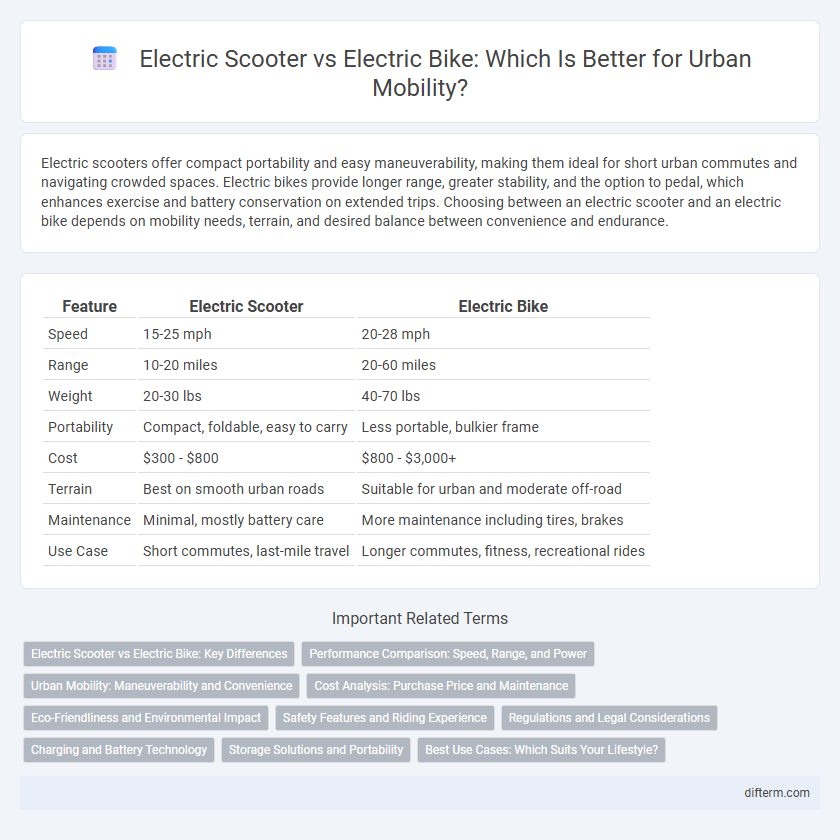Electric scooters offer compact portability and easy maneuverability, making them ideal for short urban commutes and navigating crowded spaces. Electric bikes provide longer range, greater stability, and the option to pedal, which enhances exercise and battery conservation on extended trips. Choosing between an electric scooter and an electric bike depends on mobility needs, terrain, and desired balance between convenience and endurance.
Table of Comparison
| Feature | Electric Scooter | Electric Bike |
|---|---|---|
| Speed | 15-25 mph | 20-28 mph |
| Range | 10-20 miles | 20-60 miles |
| Weight | 20-30 lbs | 40-70 lbs |
| Portability | Compact, foldable, easy to carry | Less portable, bulkier frame |
| Cost | $300 - $800 | $800 - $3,000+ |
| Terrain | Best on smooth urban roads | Suitable for urban and moderate off-road |
| Maintenance | Minimal, mostly battery care | More maintenance including tires, brakes |
| Use Case | Short commutes, last-mile travel | Longer commutes, fitness, recreational rides |
Electric Scooter vs Electric Bike: Key Differences
Electric scooters offer compact design and portability, making them ideal for short urban trips, while electric bikes provide greater range and power suited for longer commutes and varied terrains. Battery capacity and motor wattage in electric bikes typically exceed those in scooters, resulting in higher speeds and extended ride times. Maintenance costs for electric scooters tend to be lower, but electric bikes win on versatility with features like pedal assist and cargo capacity.
Performance Comparison: Speed, Range, and Power
Electric scooters typically offer speeds between 15-30 mph with ranges of 15-40 miles per charge, powered by motors ranging from 250W to 500W. Electric bikes boast higher top speeds of 20-28 mph and extended ranges of 40-70 miles, supported by motors often rated between 250W and 750W. The increased power and battery capacity in electric bikes enhance performance for longer commutes and varied terrains compared to electric scooters.
Urban Mobility: Maneuverability and Convenience
Electric scooters offer superior maneuverability in crowded urban environments due to their compact size and lightweight design, enabling quick navigation through traffic and narrow pathways. Electric bikes, while slightly larger, provide enhanced convenience with longer battery life and greater speed, suitable for longer commutes and varied terrain. Both electric scooters and bikes contribute to sustainable urban mobility by reducing carbon emissions and easing congestion in city centers.
Cost Analysis: Purchase Price and Maintenance
Electric scooters generally have a lower purchase price compared to electric bikes, making them a more affordable option for urban commuters. Maintenance costs for electric scooters tend to be less frequent but can increase with battery replacements, while electric bikes usually require regular servicing of components like chains, brakes, and tires. Evaluating total cost of ownership reveals that electric bikes, despite a higher upfront cost, may offer better long-term value due to durability and versatility in varied terrains.
Eco-Friendliness and Environmental Impact
Electric scooters produce fewer emissions over their lifecycle compared to electric bikes, mainly due to smaller battery sizes and lighter frames, reducing energy consumption. However, electric bikes offer greater efficiency for longer distances, encouraging reduced reliance on fossil fuel vehicles and promoting sustainable urban mobility. Both modes significantly lower urban air pollution and carbon footprints, making them vital options in eco-friendly transportation solutions.
Safety Features and Riding Experience
Electric scooters often feature lower speeds and compact designs, enhancing maneuverability in urban settings but posing stability challenges on rough terrain. Electric bikes provide better safety through larger wheels, more robust braking systems, and enhanced suspension, delivering a smoother and more secure ride over varied surfaces. Riders benefit from electric bikes' ergonomic seating and longer range, while electric scooters prioritize agility and portability for short-distance travel.
Regulations and Legal Considerations
Electric scooter regulations vary widely, with many regions imposing speed limits around 15-20 mph and requiring riders to wear helmets, while electric bikes often face more lenient rules as they are frequently classified similarly to traditional bicycles. Legal considerations for electric scooters generally include age restrictions, usage zones such as bike lanes or roads, and licensing requirements that differ significantly between urban and rural areas. In contrast, electric bikes usually have fewer limitations but may require registration or insurance if their motor power exceeds certain thresholds, typically 750 watts or speeds surpassing 20 mph.
Charging and Battery Technology
Electric scooters typically feature smaller batteries ranging from 200Wh to 500Wh, enabling faster charging times of 3 to 5 hours, while electric bikes often use larger battery capacities between 400Wh and 700Wh, extending their range but requiring 4 to 8 hours for a full charge. Advances in lithium-ion and solid-state battery technology are enhancing energy density, resulting in lighter, more efficient power sources for both vehicles. Battery management systems (BMS) improve safety, longevity, and charging efficiency, making electric scooters and bikes increasingly reliable for urban mobility.
Storage Solutions and Portability
Electric scooters boast compact folding designs that fit easily into small storage spaces, making them ideal for urban commuters with limited room. Electric bikes require more storage area due to their larger frames but often feature removable batteries to enhance portability. Both offer versatile storage solutions, though scooters excel in portability for short-distance travel and multi-modal commutes.
Best Use Cases: Which Suits Your Lifestyle?
Electric scooters excel in urban environments with short commutes, offering compact design and easy maneuverability for quick errands and last-mile connectivity. Electric bikes suit longer distances and varied terrains, providing enhanced stability, pedal-assist options, and better battery range for fitness enthusiasts and daily commuters. Choosing between them depends on travel distance, terrain complexity, and storage convenience aligned with your mobility needs.
Electric scooter vs Electric bike Infographic

 difterm.com
difterm.com